Report: Forms of Abuse and Safeguarding Adults in Healthcare
VerifiedAdded on 2020/07/22
|6
|1192
|82
Report
AI Summary
This report delves into the critical topic of safeguarding adults and promoting their independence within health and social care settings. It begins by identifying various forms of abuse experienced by adults, including physical, mental, and sexual abuse, and highlights the indicators that may signal abuse is occurring. The report then explores the factors that can contribute to abusive situations, emphasizing the importance of understanding the context in which abuse can arise. Key legislation and regulations, such as the Human Rights Act and the Mental Health Act 1996, are examined to illustrate the legal framework designed to protect vulnerable adults. Furthermore, the report outlines the working strategies and procedures used in health and social care to prevent and address abuse, including sector guidance, staff recruitment, and multi-agency collaboration. The role of supportive relationships is also discussed, with examples illustrating how effective communication and confidentiality can help to overcome trauma and promote well-being. The report concludes by emphasizing the importance of recognizing abuse as illegal and the significance of protective strategies in health and social care.
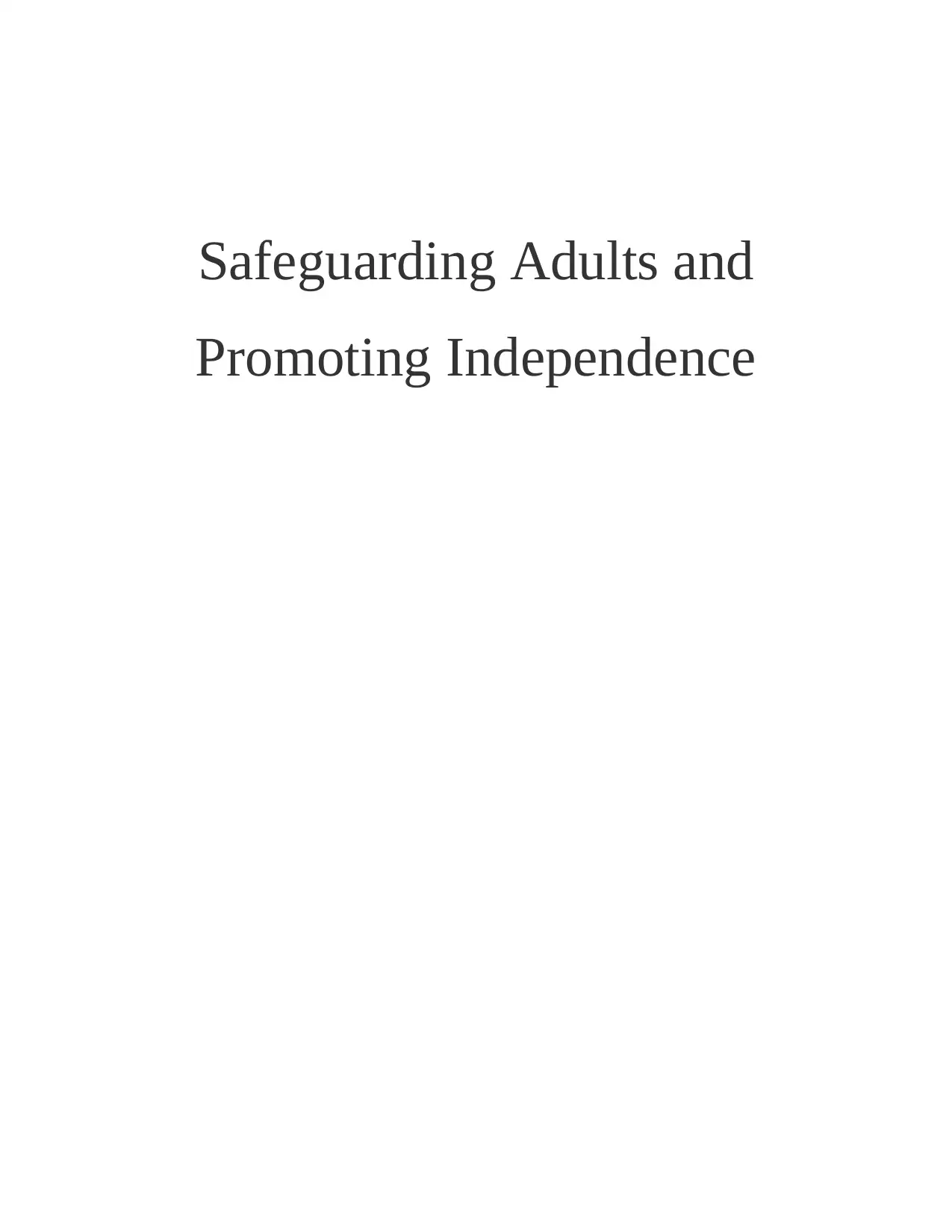
Safeguarding Adults and
Promoting Independence
Promoting Independence
Paraphrase This Document
Need a fresh take? Get an instant paraphrase of this document with our AI Paraphraser
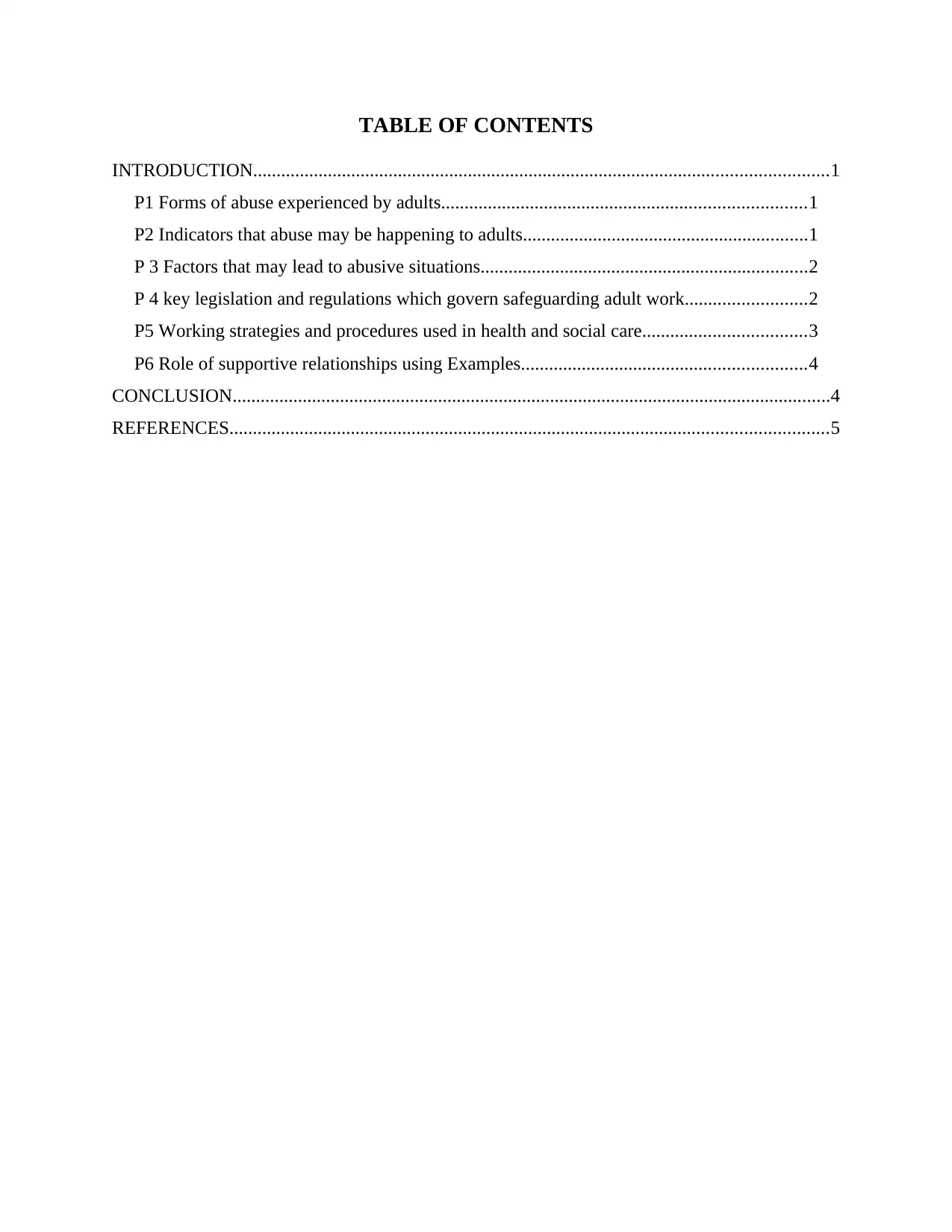
TABLE OF CONTENTS
INTRODUCTION...........................................................................................................................1
P1 Forms of abuse experienced by adults..............................................................................1
P2 Indicators that abuse may be happening to adults.............................................................1
P 3 Factors that may lead to abusive situations......................................................................2
P 4 key legislation and regulations which govern safeguarding adult work..........................2
P5 Working strategies and procedures used in health and social care...................................3
P6 Role of supportive relationships using Examples.............................................................4
CONCLUSION................................................................................................................................4
REFERENCES................................................................................................................................5
INTRODUCTION...........................................................................................................................1
P1 Forms of abuse experienced by adults..............................................................................1
P2 Indicators that abuse may be happening to adults.............................................................1
P 3 Factors that may lead to abusive situations......................................................................2
P 4 key legislation and regulations which govern safeguarding adult work..........................2
P5 Working strategies and procedures used in health and social care...................................3
P6 Role of supportive relationships using Examples.............................................................4
CONCLUSION................................................................................................................................4
REFERENCES................................................................................................................................5
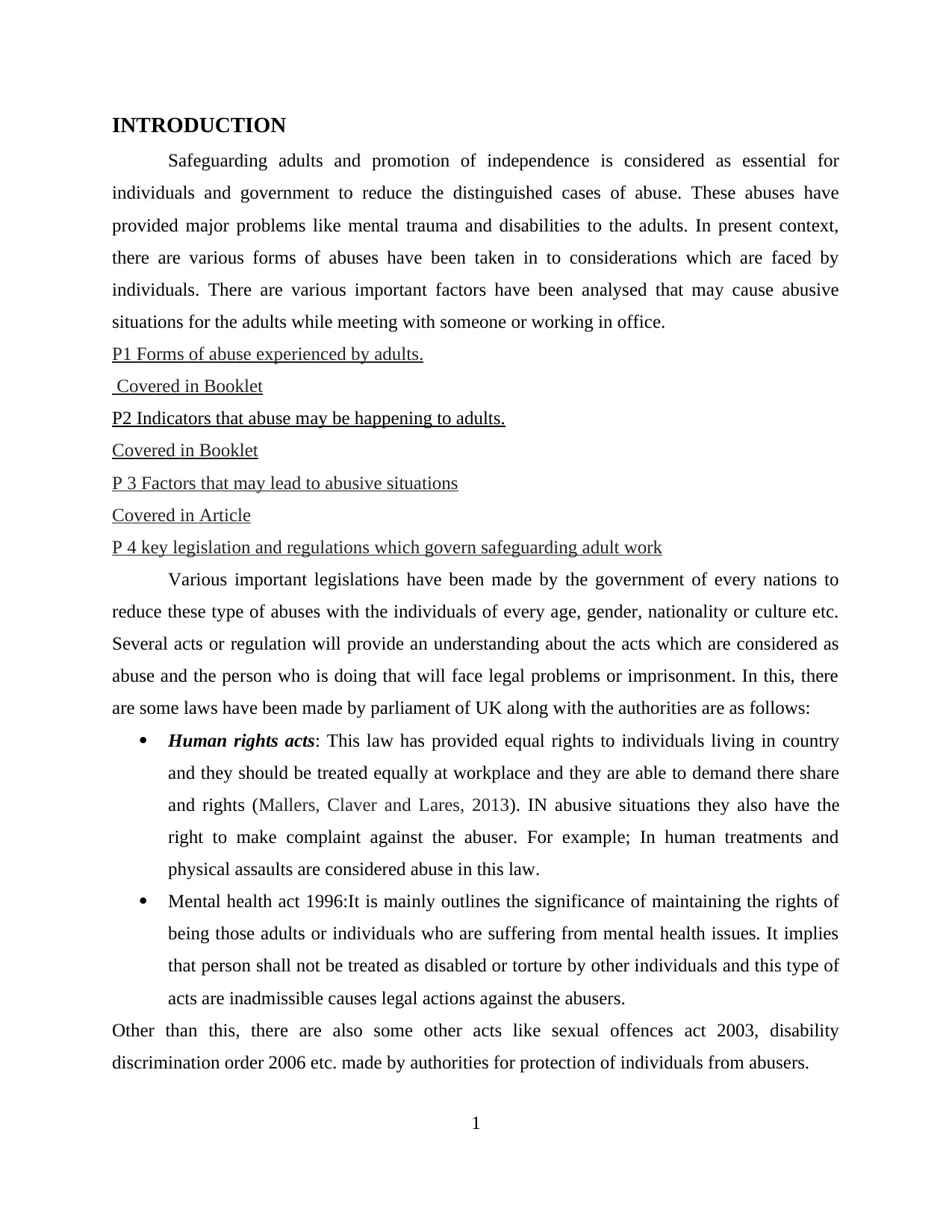
INTRODUCTION
Safeguarding adults and promotion of independence is considered as essential for
individuals and government to reduce the distinguished cases of abuse. These abuses have
provided major problems like mental trauma and disabilities to the adults. In present context,
there are various forms of abuses have been taken in to considerations which are faced by
individuals. There are various important factors have been analysed that may cause abusive
situations for the adults while meeting with someone or working in office.
P1 Forms of abuse experienced by adults.
Covered in Booklet
P2 Indicators that abuse may be happening to adults.
Covered in Booklet
P 3 Factors that may lead to abusive situations
Covered in Article
P 4 key legislation and regulations which govern safeguarding adult work
Various important legislations have been made by the government of every nations to
reduce these type of abuses with the individuals of every age, gender, nationality or culture etc.
Several acts or regulation will provide an understanding about the acts which are considered as
abuse and the person who is doing that will face legal problems or imprisonment. In this, there
are some laws have been made by parliament of UK along with the authorities are as follows:
Human rights acts: This law has provided equal rights to individuals living in country
and they should be treated equally at workplace and they are able to demand there share
and rights (Mallers, Claver and Lares, 2013). IN abusive situations they also have the
right to make complaint against the abuser. For example; In human treatments and
physical assaults are considered abuse in this law.
Mental health act 1996:It is mainly outlines the significance of maintaining the rights of
being those adults or individuals who are suffering from mental health issues. It implies
that person shall not be treated as disabled or torture by other individuals and this type of
acts are inadmissible causes legal actions against the abusers.
Other than this, there are also some other acts like sexual offences act 2003, disability
discrimination order 2006 etc. made by authorities for protection of individuals from abusers.
1
Safeguarding adults and promotion of independence is considered as essential for
individuals and government to reduce the distinguished cases of abuse. These abuses have
provided major problems like mental trauma and disabilities to the adults. In present context,
there are various forms of abuses have been taken in to considerations which are faced by
individuals. There are various important factors have been analysed that may cause abusive
situations for the adults while meeting with someone or working in office.
P1 Forms of abuse experienced by adults.
Covered in Booklet
P2 Indicators that abuse may be happening to adults.
Covered in Booklet
P 3 Factors that may lead to abusive situations
Covered in Article
P 4 key legislation and regulations which govern safeguarding adult work
Various important legislations have been made by the government of every nations to
reduce these type of abuses with the individuals of every age, gender, nationality or culture etc.
Several acts or regulation will provide an understanding about the acts which are considered as
abuse and the person who is doing that will face legal problems or imprisonment. In this, there
are some laws have been made by parliament of UK along with the authorities are as follows:
Human rights acts: This law has provided equal rights to individuals living in country
and they should be treated equally at workplace and they are able to demand there share
and rights (Mallers, Claver and Lares, 2013). IN abusive situations they also have the
right to make complaint against the abuser. For example; In human treatments and
physical assaults are considered abuse in this law.
Mental health act 1996:It is mainly outlines the significance of maintaining the rights of
being those adults or individuals who are suffering from mental health issues. It implies
that person shall not be treated as disabled or torture by other individuals and this type of
acts are inadmissible causes legal actions against the abusers.
Other than this, there are also some other acts like sexual offences act 2003, disability
discrimination order 2006 etc. made by authorities for protection of individuals from abusers.
1
⊘ This is a preview!⊘
Do you want full access?
Subscribe today to unlock all pages.

Trusted by 1+ million students worldwide
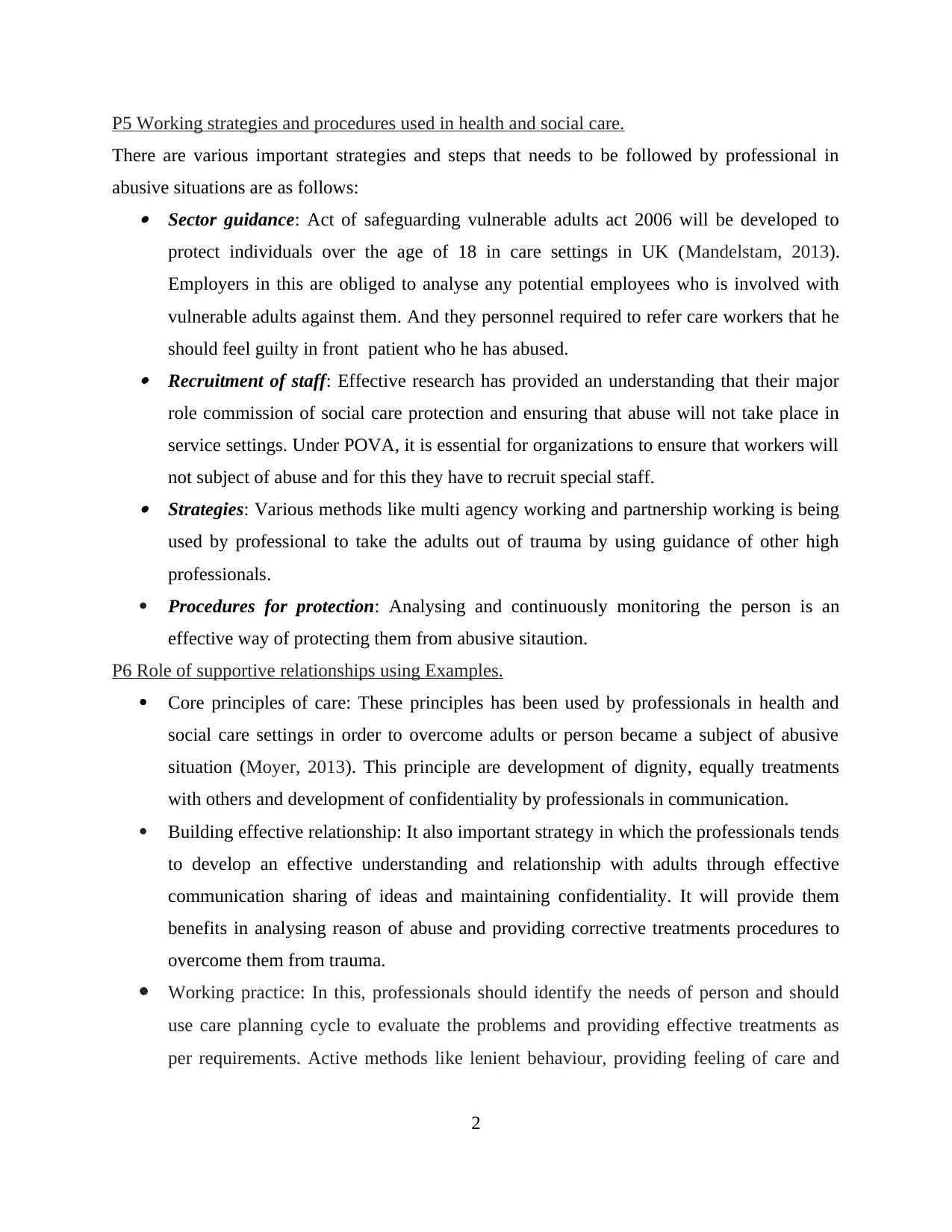
P5 Working strategies and procedures used in health and social care.
There are various important strategies and steps that needs to be followed by professional in
abusive situations are as follows: Sector guidance: Act of safeguarding vulnerable adults act 2006 will be developed to
protect individuals over the age of 18 in care settings in UK (Mandelstam, 2013).
Employers in this are obliged to analyse any potential employees who is involved with
vulnerable adults against them. And they personnel required to refer care workers that he
should feel guilty in front patient who he has abused. Recruitment of staff: Effective research has provided an understanding that their major
role commission of social care protection and ensuring that abuse will not take place in
service settings. Under POVA, it is essential for organizations to ensure that workers will
not subject of abuse and for this they have to recruit special staff. Strategies: Various methods like multi agency working and partnership working is being
used by professional to take the adults out of trauma by using guidance of other high
professionals.
Procedures for protection: Analysing and continuously monitoring the person is an
effective way of protecting them from abusive sitaution.
P6 Role of supportive relationships using Examples.
Core principles of care: These principles has been used by professionals in health and
social care settings in order to overcome adults or person became a subject of abusive
situation (Moyer, 2013). This principle are development of dignity, equally treatments
with others and development of confidentiality by professionals in communication.
Building effective relationship: It also important strategy in which the professionals tends
to develop an effective understanding and relationship with adults through effective
communication sharing of ideas and maintaining confidentiality. It will provide them
benefits in analysing reason of abuse and providing corrective treatments procedures to
overcome them from trauma.
Working practice: In this, professionals should identify the needs of person and should
use care planning cycle to evaluate the problems and providing effective treatments as
per requirements. Active methods like lenient behaviour, providing feeling of care and
2
There are various important strategies and steps that needs to be followed by professional in
abusive situations are as follows: Sector guidance: Act of safeguarding vulnerable adults act 2006 will be developed to
protect individuals over the age of 18 in care settings in UK (Mandelstam, 2013).
Employers in this are obliged to analyse any potential employees who is involved with
vulnerable adults against them. And they personnel required to refer care workers that he
should feel guilty in front patient who he has abused. Recruitment of staff: Effective research has provided an understanding that their major
role commission of social care protection and ensuring that abuse will not take place in
service settings. Under POVA, it is essential for organizations to ensure that workers will
not subject of abuse and for this they have to recruit special staff. Strategies: Various methods like multi agency working and partnership working is being
used by professional to take the adults out of trauma by using guidance of other high
professionals.
Procedures for protection: Analysing and continuously monitoring the person is an
effective way of protecting them from abusive sitaution.
P6 Role of supportive relationships using Examples.
Core principles of care: These principles has been used by professionals in health and
social care settings in order to overcome adults or person became a subject of abusive
situation (Moyer, 2013). This principle are development of dignity, equally treatments
with others and development of confidentiality by professionals in communication.
Building effective relationship: It also important strategy in which the professionals tends
to develop an effective understanding and relationship with adults through effective
communication sharing of ideas and maintaining confidentiality. It will provide them
benefits in analysing reason of abuse and providing corrective treatments procedures to
overcome them from trauma.
Working practice: In this, professionals should identify the needs of person and should
use care planning cycle to evaluate the problems and providing effective treatments as
per requirements. Active methods like lenient behaviour, providing feeling of care and
2
Paraphrase This Document
Need a fresh take? Get an instant paraphrase of this document with our AI Paraphraser
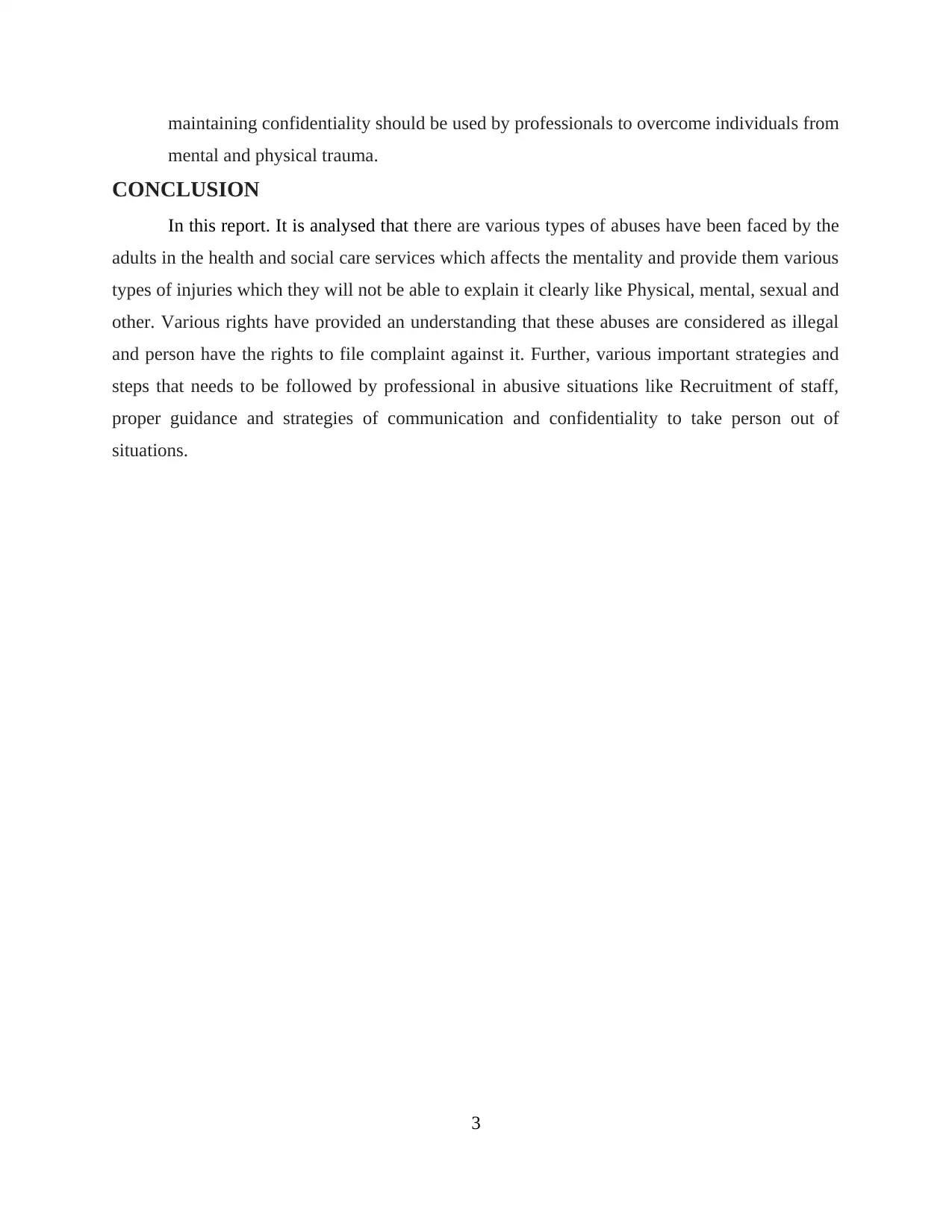
maintaining confidentiality should be used by professionals to overcome individuals from
mental and physical trauma.
CONCLUSION
In this report. It is analysed that there are various types of abuses have been faced by the
adults in the health and social care services which affects the mentality and provide them various
types of injuries which they will not be able to explain it clearly like Physical, mental, sexual and
other. Various rights have provided an understanding that these abuses are considered as illegal
and person have the rights to file complaint against it. Further, various important strategies and
steps that needs to be followed by professional in abusive situations like Recruitment of staff,
proper guidance and strategies of communication and confidentiality to take person out of
situations.
3
mental and physical trauma.
CONCLUSION
In this report. It is analysed that there are various types of abuses have been faced by the
adults in the health and social care services which affects the mentality and provide them various
types of injuries which they will not be able to explain it clearly like Physical, mental, sexual and
other. Various rights have provided an understanding that these abuses are considered as illegal
and person have the rights to file complaint against it. Further, various important strategies and
steps that needs to be followed by professional in abusive situations like Recruitment of staff,
proper guidance and strategies of communication and confidentiality to take person out of
situations.
3
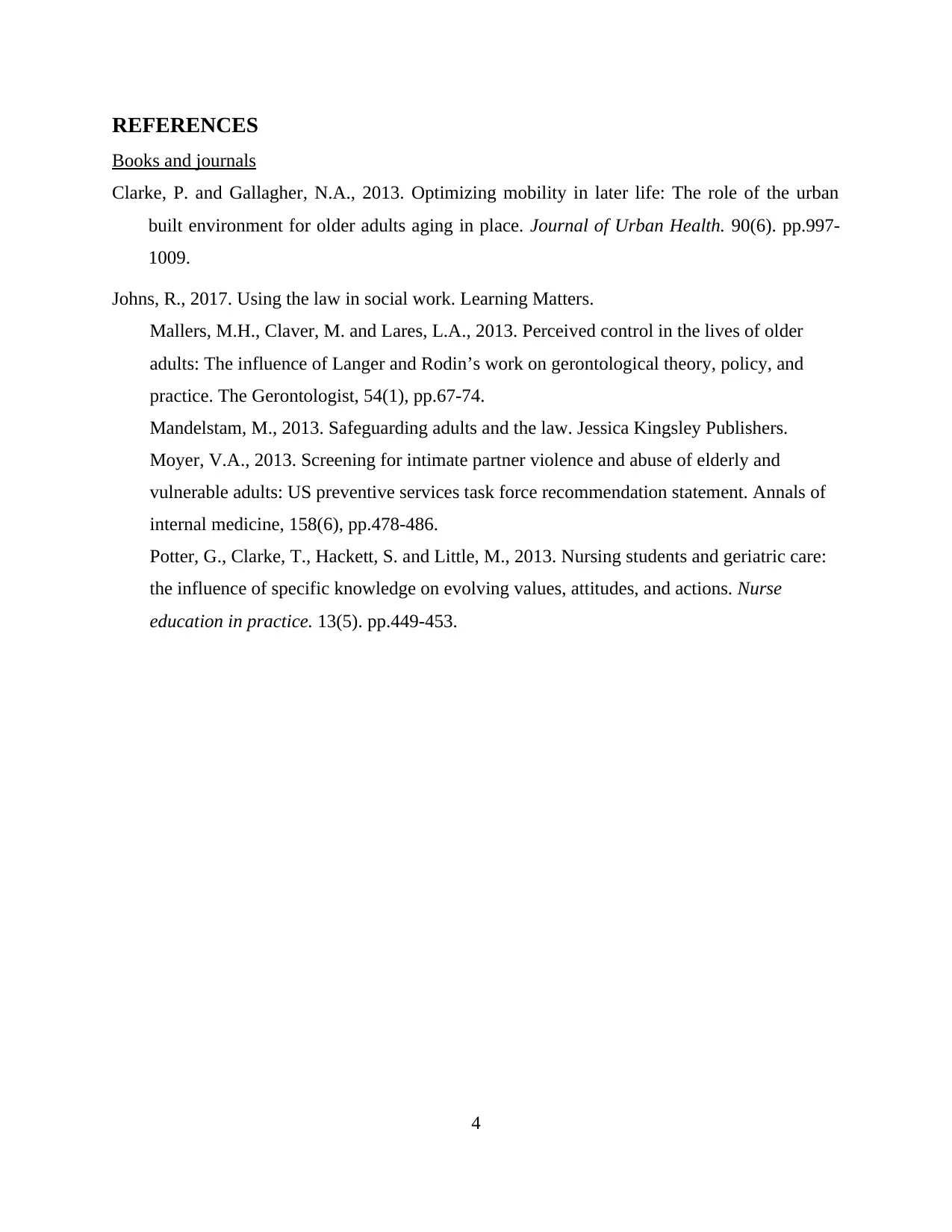
REFERENCES
Books and journals
Clarke, P. and Gallagher, N.A., 2013. Optimizing mobility in later life: The role of the urban
built environment for older adults aging in place. Journal of Urban Health. 90(6). pp.997-
1009.
Johns, R., 2017. Using the law in social work. Learning Matters.
Mallers, M.H., Claver, M. and Lares, L.A., 2013. Perceived control in the lives of older
adults: The influence of Langer and Rodin’s work on gerontological theory, policy, and
practice. The Gerontologist, 54(1), pp.67-74.
Mandelstam, M., 2013. Safeguarding adults and the law. Jessica Kingsley Publishers.
Moyer, V.A., 2013. Screening for intimate partner violence and abuse of elderly and
vulnerable adults: US preventive services task force recommendation statement. Annals of
internal medicine, 158(6), pp.478-486.
Potter, G., Clarke, T., Hackett, S. and Little, M., 2013. Nursing students and geriatric care:
the influence of specific knowledge on evolving values, attitudes, and actions. Nurse
education in practice. 13(5). pp.449-453.
4
Books and journals
Clarke, P. and Gallagher, N.A., 2013. Optimizing mobility in later life: The role of the urban
built environment for older adults aging in place. Journal of Urban Health. 90(6). pp.997-
1009.
Johns, R., 2017. Using the law in social work. Learning Matters.
Mallers, M.H., Claver, M. and Lares, L.A., 2013. Perceived control in the lives of older
adults: The influence of Langer and Rodin’s work on gerontological theory, policy, and
practice. The Gerontologist, 54(1), pp.67-74.
Mandelstam, M., 2013. Safeguarding adults and the law. Jessica Kingsley Publishers.
Moyer, V.A., 2013. Screening for intimate partner violence and abuse of elderly and
vulnerable adults: US preventive services task force recommendation statement. Annals of
internal medicine, 158(6), pp.478-486.
Potter, G., Clarke, T., Hackett, S. and Little, M., 2013. Nursing students and geriatric care:
the influence of specific knowledge on evolving values, attitudes, and actions. Nurse
education in practice. 13(5). pp.449-453.
4
⊘ This is a preview!⊘
Do you want full access?
Subscribe today to unlock all pages.

Trusted by 1+ million students worldwide
1 out of 6
Related Documents
Your All-in-One AI-Powered Toolkit for Academic Success.
+13062052269
info@desklib.com
Available 24*7 on WhatsApp / Email
![[object Object]](/_next/static/media/star-bottom.7253800d.svg)
Unlock your academic potential
Copyright © 2020–2025 A2Z Services. All Rights Reserved. Developed and managed by ZUCOL.





